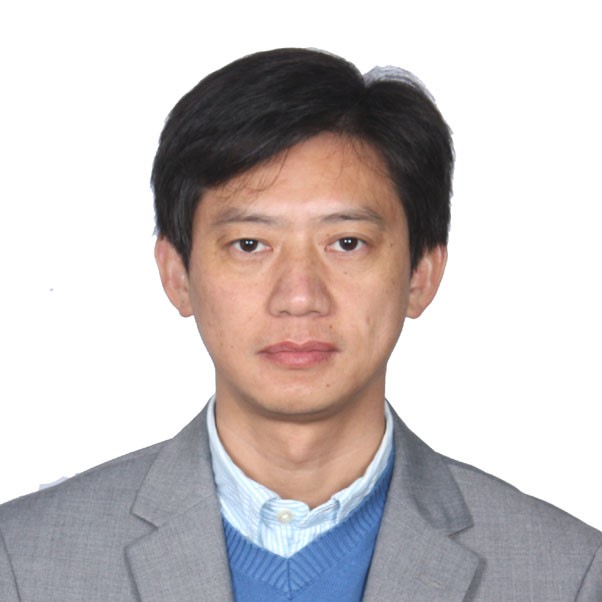
| Dr. Yanghui Zhang, Professor
School of Chemical Science and Engineering, Tongji University
|
Office:
| Chemistry Building 234
Siping Road 1239, Shanghai 200092, P. R. China
|
Tel:
| +86-21-65989295
|
Fax:
| +86-21-65981097
|
E-mail:
| zhangyanghui@tongji.edu.cn
|
Yanghui Zhang’s Homepage:http://zhangyhgroup.tongji.edu.cn
|
Introduction
Employment:
January, 2011–Present,Professor, School of Chemical Science and Engineering, Tongji University, Shanghai, China
May, 1999–May, 2002,Research Chemist, Shanghai Institute of Organic Chemistry, Shanghai, China.
Education:
October, 2007–January, 2011,Postdoctoral Associate, The Scripps Research Institute, La Jolla, CA, USA. (Advisor: Professor Jin-Quan Yu)
August, 2002–August, 2007,Ph.D. Organic Chemistry, University of Georgia, Athens, GA, USA. (Advisor: Professor Geert-Jan Boons)
September, 1996–March, 1999,M.S. Organic Chemistry, Tongji Univeristy, Shanghai, China. (Advisor: Professor Zhijing Jiang).
September, 1991–July, 1996,B.S. Applied Chemistry, Tongji Univeristy, Shanghai, China
I. Research Area
1. Transition Metal-Catalyzed C-H Functionalization Reactions
2. Green Chemistry
3. Carbohydrate Chemistry
As a central discipline in chemistry, the field of organic synthesis has provided indispensable and powerful tools for biology, medicine, and materials, and has had tremendous impacts on energy and the environment. Organic synthesis has a strong relevance to human life at a fundamental level.
Research in our group is centered around organic synthesis, primarily focusing on synthetic methodology at the early stage. The synthesis of complex molecules relies on a variety of reliable and broadly useful reactions, which are the cornerstones of organic synthesis. Although numerous reactions have been extensively developed, a number of transformations are still in their infancy. It is thus the mission of modern organic chemistry to develop novel organic reactions that are powerful, efficient, atom-economical, environmentally benign.
One type of reaction that our group studies is C–H functionalization. Modern organic synthesis relies mainly on the interconversion of functional groups. Due to their inertness, carbon–hydrogen (C–H) bonds are not generally viewed as functional groups in this context. Direct functionalization of C–H bonds would obviate the need for unproductive functional groups manipulations and reduce chemical waste. Moreover, C–H functionalization can provide opportunities for markedly different synthetic strategies with improved overall efficiency. The long-term goal is to apply C-H functionalization reactions to the synthesis of organic molecules, particularly in the field of pharmaceutical chemistry.
Another research area in our group is carbohydrate synthesis. Carbohydrates play crucial roles in many biological processes and have great potential for drug development. Due to their structural complexity, the chemical synthesis of oligosaccharides is much more complicated than the synthesis of peptide and oligonucleotides. Our group will pursue the development of efficient carbohydrate synthetic methods, and the synthesis of oligosaccharides for drug discovery and biological studies.
II. Honors & Awards
1.Pujiang Scholar of Shanghai Science and Technology Commission (A), Shanghai, China.
III. Academic Achievements
Yanghui Zhang has published about 30 papers in Journal of the American Chemical Society, Angewandte Chemie, International Edition, and other journals. His research works have been highlighted or featured in magazines such as Chemical & Engineering News and Science many times, and the number of citations is about 1500.
IV. Grants:
1. The National Natural Science Foundation of China (General Program), January, 2017-December, 2020.
2. The National Natural Science Foundation of China (General Program), January, 2014-December, 2017.
3.Pujiang Project of Shanghai Science and Technology Commission, October, 2011-September,2013.
V. Selected Publication:
INDEPENDENT CAREER:
1.Guangfa Shi; Dushen Chen; Hang Jiang; Yu Zhang;Yanghui Zhang*"Synthesis of Fluorenes Starting from 2-Iodobiphenyls and CH2Br2through Palladium-Catalyzed Dual C-C Bond Formation"Org. Lett.2016, 18,2958-2961.
2.Hang Jiang; Yu Zhang; Dushen Chen; Bo Zhou;Yanghui Zhang* "An approach to tetraphenylenes via Pd-catalyzed C-H functionalization"Org. Lett.2016,18,2032-2035.
3.Dushen Chen; Guangfa Shi; Hang Jiang; Yu Zhang;Yanghui Zhang* "Sequential difunctionalization of 2-Iodobiphenyls by exploiting the reactivities of a palladacycle and an acyclic arylpalladium species"Org. Lett.2016,18,2130-2133.
4.Jingxun, Yu; Jun, Liu; Guangfa, Shi; Changdong, Shao;Yanghui, Zhang*, Ligand-promoted oxidative cross-coupling of aryl boronic acids and aryl silanes by palladium catalysis,Angew. Chem. Int. Ed.2015,54,4079-4082.
Reported inC&E News2015,February 16, 7.
VIP paper.
5.Guangfa Shi; Changdong, Shao; Shulei, Pan; Jingxun, Yu;Yanghui, Zhang*, Silver-catalyzed C–H trifluoromethylation of arenes using trifluoroacetic acid as the trifluoromethylating reagent,Org. Lett.2015,17, 38-41.
6.Hongqiang, Liu; Guangfa Shi; Shulei, Pan; Yuyu, Jiang;Yanghui, Zhang*, Palladium-catalyzed benzylation of carboxylic acids with toluene via benzylic C-H activation,Org. Lett.2013,15, 4098-4101.
7.Yanghui, Zhang; Guangfa Shi; Jin-Quan, Yu,Carbon–Carbonσ-Bond Formation via C–H Bond FunctionalizationinComprehensive Organic Synthesis2ndEdition,Vol. 3(Eds.: G. Molander, P. Knochel), Elsevier: Oxford,2014, pp 1101-1209.
GRADUATE, AND POSTDOCTORAL:
1.Yanghui Zhang; Jinquan Yu, Pd(II)-catalyzed hydroxylation of arenes with 1 atm O2or air,J. Am. Chem. Soc.2009,131, 14654-14655.
Reported in C&E News 2009, October 12, 44.
Featured in SynFacts.
Featured online at the Organic Chemistry Portal.
One of the Top 20 most read JACS articles in November 2009.
2.Yanghui Zhang; Bingfeng Shi; Jinquan Yu, Pd(II)-catalyzed ortho-alkylation of benzoic acids with alkyl halides,Angew. Chem. Int. Ed.2009,48, 6097-6100.
Selected as a hot paper.
3.Yanghui Zhang; Bingfeng Shi; Jinquan Yu, Pd(II)-catalyzed olefination of electron-deficient arenes using 2,6-dialkyl pyridine ligands,J. Am. Chem. Soc.2009,131, 5072-5074.
Featured in Science 2009, 324, 15.
Reported in C&E News. 2009, March 23, 7.
Featured in ChemCatChem. 2009, 1, 69.
Featured in SynFacts 2009, 7, 0785.
Featured in Angew. Chem. Int. Ed. 2009, 48, 7126.
4.Yanghui Zhang; Jidnyasa Gaekwad; Margreet A. Wolfert; Geert-Jan Boons,J. Am. Chem. Soc.2007,129, 5200-5216.
